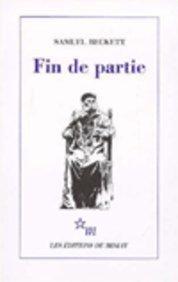French language
Published by Les Éditions de Minuit.

French language
Published by Les Éditions de Minuit.
Endgame, by Samuel Beckett, is an absurdist, tragicomic one-act play about a blind, paralyzed, domineering elderly man, his geriatric parents and his doddering, dithering, harried, servile companion in an abandoned shack in a post-apocalyptic wasteland who mention their awaiting some unspecified “end” which seems to be the end of their relationship, death, and the end of the actual play itself. Much of the play’s content consists of terse, back and forth dialogue between the characters reminiscent of bantering, along with trivial stage actions; the plot is held together by the development of a grotesque story-within-a-story the character Hamm is writing. An aesthetically profound part of the play is the way the story-within-story and the actual play come to an end at roughly the same time. The play’s title refers to chess and frames the characters as acting out a losing battle with each other or their fate. It was originally …
Endgame, by Samuel Beckett, is an absurdist, tragicomic one-act play about a blind, paralyzed, domineering elderly man, his geriatric parents and his doddering, dithering, harried, servile companion in an abandoned shack in a post-apocalyptic wasteland who mention their awaiting some unspecified “end” which seems to be the end of their relationship, death, and the end of the actual play itself. Much of the play’s content consists of terse, back and forth dialogue between the characters reminiscent of bantering, along with trivial stage actions; the plot is held together by the development of a grotesque story-within-a-story the character Hamm is writing. An aesthetically profound part of the play is the way the story-within-story and the actual play come to an end at roughly the same time. The play’s title refers to chess and frames the characters as acting out a losing battle with each other or their fate. It was originally written in French (entitled Fin de partie) and was translated into English by Beckett himself. The play was first performed on April 3rd, 1957 at the Royal Court Theatre in London in a French-language production. Written before but premiered after Waiting for Godot, it is arguably among Beckett's best works. The literary critic Harold Bloom called it the greatest prose drama of the 20th century, saying "I know of no other work of its reverberatory power", but stated that he could not handle reading it in old age for its harrowing, barebone existentialism. Samuel Beckett considered it his masterpiece as the most aesthetically perfect, compact representation of his artistic views on human existence, and refers to it when speaking autobiographically through Krapp in Krapp's Last Tape when he mentions he had “already written the masterpiece”..